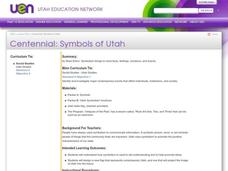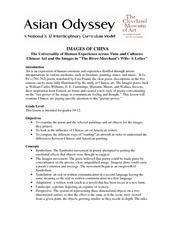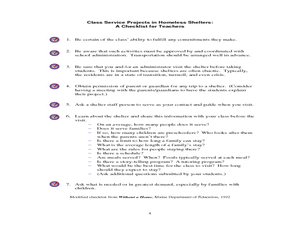Curated OER
Finding Your Story: Helping Students Begin Their Memoir
Students write their memoir. In this memoir lesson, students study the differences between an autobiography and a memoir. Students construct an outline as the basis for their memoir.
Curated OER
The Dragonslayers Ch. 13 & 14
In this worksheet, 4th graders answer 14 comprehension questions from chapters 13 & 14 of the book, The Dragonslayers. An answer key is provided.
Curated OER
When You're Hot, You're Hot...
Young scholars use the medium of visual arts to demonstrate how colors can evoke different ideas and feelings.
Curated OER
Centennial: Symbols of Utah
Fourth graders examine how symbols bring to mind facts, feelings, emotions, and events. They design a new, contemporary flag to promote the state of Utah.
Curated OER
What We Read About
Students examine current events and create an artistic image that portrays the feelings brought forth by these readings.
Curated OER
Impact on Your Essence
Students are introduced to the use of symbolism and how it can change one's view of a piece of art. Using a piece of art, they view it as if they were the artist and create a symbol that accompanies it. They discuss the impact of two-...
Curated OER
Recreating a Masterpiece
Students analyze and critique various artists and their work. They write research papers on artists and create reproductions of their works, reflecting their earlier critiques of the works.
Curated OER
The Window
Students read a story entitled, "The Window," and discover how some cultures are rejected by others. Students write a letter expressing feelings of rejection and keep a journal of significant events in the story. Using a graphic...
Curated OER
Strange Encounters
Third graders examine a variety of Robert Harris' paintings. Using the characters in the art, they develop a conversation between them in a musical verse. In groups, they identify safety procedures to be used by those traveling in the...
Curated OER
Storytellers: Dave Matthews Band
Pupils listen to the music of the Dave Matthews Band in order to discuss and analyze the lyrics. They examine how the songs are presented and determine if the Dave Matthews Band does a good job of presenting the meaning of the lyrics in...
Curated OER
Territorial Expansion
Eleventh graders brainstorm a list of characteristics of adolescence. They use selected websites and draw a parallel between the characteristics of adolescence and the characterisitcs of Romanticism, as seen in visual art and literature.
Curated OER
Poetry and the American Presidents
Fifth graders choose a poetry activity in order to focus their research about American presidents.
Curated OER
VH1 Fan Club
Students connect the diversity of American culture to the music of Dave Matthews Band and then create lyrics that emphasize how diversity pertains to their own life.
Curated OER
Current Event/Public Outcry
Twelfth graders discuss the shooting of a police officer. They choose a writing form - essay or poem- and express their views about the event.
Curated OER
What Can We Do Today?
Students practice rereading selected passages to improve their reading fluency. Working in pairs, students read and reread decodable, leveled passages fluently and with expression. They are assessed by their partner, using a fluency...
Curated OER
Persuasive Paper: RFID
Young scholars write a persuasive essay. In this persuasive writing lesson plan, students argue either for or against RFID technology. Young scholars research RFID both as a class and individually, and follow paragraph-by-paragraph...
Curated OER
Images of China
Young scholars examine the Chinese poem "The River-Merchant's Wife: A Letter" by Li Po while comparing the different ways of "reading" an artwork in order to understand the differences between Chinese and American painting.
Curated OER
Lesson 3 - Songs for Soldiers
Students reflect on their own musical preferences, and how those preferences may be incorporated into self-expression.
Curated OER
Helping Occupations
Second graders discuss careers that help students and write these in their handout.
Curated OER
Coping with Job Loss
Students discuss the different stages of job loss. In this communication lesson, students brainstorm ways to cope with this situation. They share their ideas in class.
Curated OER
And The Oscar Goes To?
Third graders complete a graphic organizer to determine what a good story looks and sounds like. Using various forms and conventions, they determine which style to use for different audiences and purposes. They write their own story and...
Curated OER
Five Simple Poems
Learners listen as the teacher explains what poetry is as well as describes several types of poetry such as haiku, free verse, limerick, cinquain, and an acrostic. Students read examples of each type of poetry. They compose a poem...
Curated OER
No Place Like Homelessness
Students complete a unit of activities that help them understand homelessness, its causes, and ways to better the situation. In this homelessness lesson, students complete five activities that help them to define homelessness and its...
Curated OER
Change slander to remorse: Unscripted Scenes
High schoolers hypothesize about the content of unscripted moments, search for evidence in the actual text to support their hypothesis, and explore how this hypothesis would affect characterization.

























